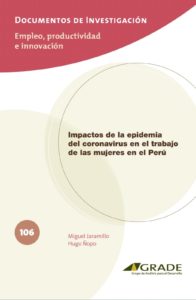Impactos de la epidemia del coronavirus en el trabajo de las mujeres en el Perú
| Year | : | 2020 |
|---|---|---|
| Author/s | : | Miguel Jaramillo, Hugo Ñopo |
| Area/s | : | Employment, productivity and innovation |
Jaramillo, M. & H. Ñopo (2020). Impactos de la epidemia del coronavirus en el trabajo de las mujeres en el Perú [Documento de Investigación, 106]. Lima: GRADE.
The study aimed to analyze the potential effects of the crisis on the employment and labor income of women in Peru. To achieve this, the research team did a comparative analysis of the labor insertion of women in contrast to men, exploring their strengths and weaknesses in the face of the Covid-19 pandemic situation. The study included women heads of household, some relevant intersectionalities for the design of policies, such as the level of poverty, ethnicity, and urban or rural residence, and the possible evolution of domestic violence. The methodology was quantitative, focused on the 2018 National Household Survey. The analysis units included individuals, households, vulnerable groups, and subsectors of the economy. Results showed that the impact of the pandemic in the short term (quarantine for all except essential economic activities) and medium-term (considering the first stage of restarting productive activity) is similar for men and women. However, particularly vulnerable groups in this context include women in the urban environment, with multiple children, working in the commerce and service sectors, and informally. Some recommendations to improve employability are: reducing barriers to work for women by promoting formal part-time work, child care programs, and bonuses for single parents; providing training to women and supporting them in their job search, and promoting the use of technology in commerce and services sectors, where there is greater participation of women, avoiding contagion, among others. Finally, regarding the prevention and action on gender violence, effective monitoring is suggested, complaint booths in crowded places, and the activation of shelter homes.






